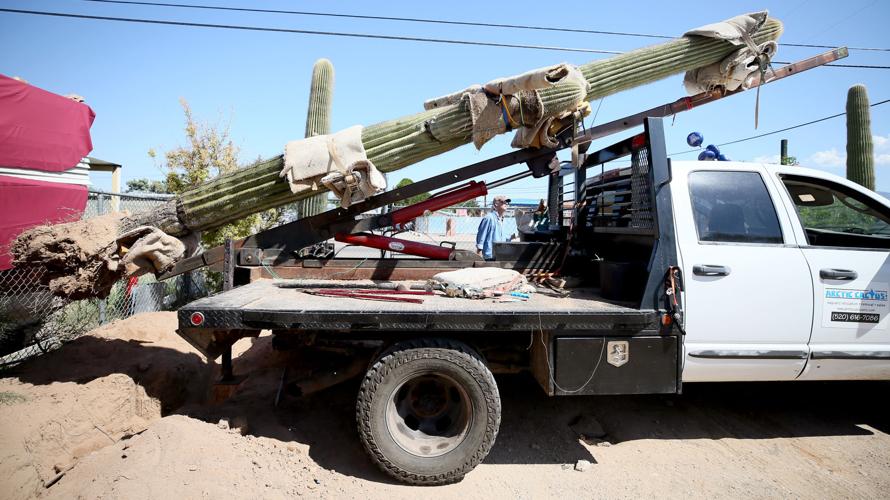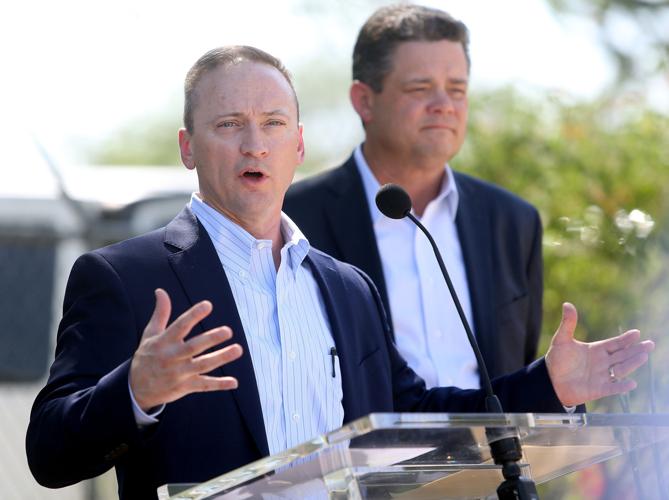Tucson is launching its courtship of online retail giant Amazon by sending a plant — a really big plant.
On Wednesday, Sun Corridor Inc. loaded a 21-foot saguaro cactus on a flatbed truck to deliver to founder Jeff Bezos at Amazon in Seattle, in a bid to bring Amazon’s planned second headquarters to Tucson.
“This will be a very competitive process nationally,” said Joe Snell, president and CEO of Sun Corridor, the Tucson region’s main economic-development agency.
“We want to break through the clutter and be noticed by Amazon,” he said of the saguaro gift, which cost about $2,000 and was privately funded.
The hope is Amazon will keep the gift saguaro and plant it in the gardens of a massive biodome complex the company is building as part of its new headquarters in Seattle.
Amazon announced last week that it is planning to build a second corporate headquarters location and says it is considering metropolitan areas with more than 1 million in population.
Snell said Sun Corridor is working with state, regional and local partners, to gather information for a bid — including an expected package of state and local financial incentives — to Amazon.
The company says it will hire as many as 50,000 new full-time employees over the next 10 to 15 years and invest more than $5 billion in capital in its second headquarters. The new location will include a site that is urban or suburban and require 8 million square feet of space.
Amazon is expected to attract several bids, including some with rich financial incentives. Since Amazon announced its plans last week, Chicago, Philadelphia and Toronto have announced they will submit bids.
Proposals are due Oct. 19, with a decision expected in 2018.
Snell said Sun Corridor, which derives 80 percent of its funding from private sources, will work with Gov. Doug Ducey and the Arizona Commerce Authority to submit a strong case for Amazon to pick Tucson.
The state offers a variety of tax breaks and other incentives — in most cases conditionally based on new jobs created and capital invested — that could add up to millions of dollars for Amazon over time.
The city of Tucson may offer inducements such as its Primary Jobs Incentive Program, which provides construction sales-tax offsets for eligible costs including job training costs and impact fees.
Other city incentives are targeted at development downtown, which may lack the open space Amazon needs.
Given the size of Amazon’s project and its potential benefits, Tucson can’t afford to sit on the sidelines, said Dave Hutchens, chairman of Sun Corridor Inc. and president and CEO of UNS Energy Corp. and Tucson Electric Power Co.
“We’re going to not only get their attention, but we’re going to put together an attractive package,” Hutchens said. “We gotta take this shot — it’s a big community-changing opportunity.”
“Needless to say, this is the biggest economic-development deal in several decades,” Sun Corridor’s Snell said. “This will transform the economy of any community they select.”
Snell and local officials including Mayor Jonathan Rothschild and Pima County Board of Supervisors Chair Sharon Bronson said Tucson can compete and win.
They point to Raytheon Missile Systems’ decision to add some 2,000 jobs here in the next five years, and the city’s successful campaign to land Caterpillar’s new Surface Mining and Technology Division headquarters, which is under construction downtown.
When Tucson made the short list for Tesla’s electric-car battery “gigafactory” last year, Snell said, the experience woke many people up to the city’s potential, even though Tesla eventually chose a site in Nevada.
“With our experience with Tesla, and how close we came — that’s why we’re here today,” he said.
“This isn’t just a pipe dream,” Hutchens said, adding that Tucson is “right-sized” for Amazon’s requirement.
In 2015, the population of the entire Tucson metropolitan statistical area — comprising all of Pima County — was an estimated 998,537, according to the U.S. Census Bureau.
For its part, TEP stands ready to help Amazon with sustainable power, renewable-energy options and emerging battery storage technologies, Hutchens said, noting that TEP is in the top tier of utilities in its class for reliability.
Hutchens said Tucson’s location as a commercial crossroads between California and Texas and its proximity to Mexico makes it a prime logistics location, while its warm, sunny weather and plethora of outdoor activities make for a high quality of life that is attractive to employees.
The University of Arizona offers a top-ranked Management Information Systems program in its Eller College of Management and graduates thousands of students each year, providing Amazon a ready pipeline of talent, Hutchens said.
“That’s what I hope will make Amazon dig a little deeper,” he said.
Tucson appears somewhat deficient under Amazon’s requirements in at least a couple of areas, including airline service and mass transit.
Hutchens said Tucson International Airport already has nonstop flights to Seattle-Tacoma on Alaska Airlines and seasonally on Delta Air Lines, as well as nonstops to the San Francisco Bay Area.
Tucson lost an American Airlines nonstop flight to New York John F. Kennedy International Airport launched last fall after failing to fill enough seats, costing local supporters $3 million in airline revenue guarantees. But the airport recently celebrated the return of nonstops to San Jose, California, on Alaska.
But Hutchens said airport and business leaders are still working to get new nonstops to New York and other destinations cited by Amazon, including Washington, D.C., while an influx of Amazon workers would help support new flights.
“We will have enough critical mass to support those flights,” he said.
Tucson may lag other competing cities for mass-transit services, which are specifically mentioned in Amazon’s requirements for the new site.
Though Tucson lacks a network of commuter trains like many larger cities, it has citywide bus service and the Sun Link streetcar downtown, which could be expanded, Snell said.
“We have more assets than deficiencies for this project,” he said.





